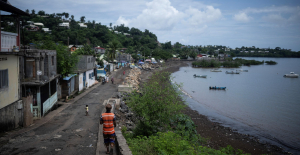From support for Hamas to its strong condemnation, the world is divided on the fourth day of the conflict between the Jewish state and the Palestinian terrorist organization. On Saturday morning, October 7, Hamas attacked Israel, by land, sea and sky, creating an effect of total surprise. Armed fighters have kidnapped more than a hundred people, civilians and soldiers, whom they are still holding hostage. A massive kidnapping which was accompanied by killings carried out when they swept across the country. In response, Israel promised to wage merciless war.
Since the start of the conflict, a large number of countries have already “strongly condemned” this attack which has already left more than 900 dead on the Israeli side and more than 680 on the Palestinian side, according to local authorities.
Other states, on the contrary, welcomed the offensive and officially supported the terrorist organization: Iran, Algeria and Tunisia.
Some, finally, chose a third path by preferring to call for de-escalation and a “ceasefire”, without explicitly condemning the Hamas attack. Since the start of this conflict, a new map of international power relations has emerged, as highlighted by Le Grand continent.
Iran was the first country to show its support for Hamas. “Iran supports the legitimate defense of the Palestinian nation,” declared President Ebrahim Raïssi on Sunday, October 8, calling on “Muslim governments” to do the same. The country, which finances and supports Hamas, is even suspected of having helped the organization prepare its offensive against the Jewish state, according to an investigation by the Wall Street Journal. What the Islamic Republic has firmly denied. “The accusations linked to the role of Iran” in the Hamas offensive against Israel “are based on political motives,” said the spokesperson for Iranian diplomacy. Before adding that Tehran did not intervene “in the decision-making of other nations, including Palestine”.
Algeria has also taken a position by directly supporting Hamas and considering the Jewish state as solely responsible. The country insisted on the right of Palestinians to fight the “Zionist occupation” of Israel, which is part of a “policy of oppression and persecution imposed on the valiant Palestinian people”, we can read in a press release from the Ministry of Foreign Affairs. “Algeria follows with deep concern the escalation of barbaric Zionist attacks against the Gaza Strip, which have cost the lives of dozens of innocent children of the Palestinian people, who have fallen as martyrs.”
Tunisia also wished to denounce “a Zionist occupation” which has lasted “for decades” and which, according to it, is at the origin of the conflict. She thus expressed “total and unconditional support for the Palestinian people”.
Other states, on the contrary, refrained from strongly condemning Hamas, preferring to call for a ceasefire on both sides, and sometimes engaging in a difficult balancing act.
Egypt was, for its part, the first country to have normalized its relations with the Hebrew State, in 1979. It was thus concerned about the “serious consequences” of the escalation of violence, as of Saturday morning. The Egyptian Ministry of Foreign Affairs even called for “maximum restraint in avoiding exposing civilians to greater danger.”
The United Arab Emirates and Bahrain, two countries which normalized their relations with Israel in 2020 through the Abraham Accords negotiated by the government of American President Donald Trump, for their part denounced the hostage-taking of Israeli civilians. The Emirates also called for intensifying diplomatic efforts to “avoid a wider regional confrontation”. While denouncing “violent attempts aimed at derailing ongoing regional efforts in favor of dialogue”.
In addition to these two Gulf countries, Morocco has also established diplomatic ties with Israel in recent years. These peaceful relations today place the Maghreb country in a delicate position. In a press release from the Ministry of Foreign Affairs, Rabat insisted on “its deep concern following the deterioration of the situation and the outbreak of military actions in the Gaza Strip and condemns the attacks against civilians wherever they are. ". The king therefore called for “an immediate end to all acts of violence and a return to appeasement, while avoiding all forms of escalation that could undermine the chances of peace in the region.”
Morocco will also chair an “extraordinary” meeting of the Arab League, in Cairo (Egypt), this Wednesday, October 11, to discuss “means of political action at the Arab and international level to put an end to Israeli aggression on the Gaza strip". The secretary general of this organization of Arab states had assured a little earlier that the League rejected violence “on both sides” and called for finding “a just resolution to the Israeli-Palestinian conflict”.
If Saudi Arabia had also initiated talks with a view to a possible normalization of relations with Israel, once again under the aegis of the United States, this attack on Israel seems to have stopped the dynamic. The Gulf country is thus playing a balancing act: the Saudi Foreign Ministry has called for an “immediate end to violence between Israelis and Palestinians”. Before specifying: “We are following the unprecedented events between Palestinian factions and the Israeli occupying forces which have led to a high level of violence on several fronts.”
Turkey is also trying to maintain a balance. Because it does not directly support the offensive led by Hamas against Israel. She thus condemns the deaths of civilians while President Erdogan called on “all parties to act with restraint” and “refrain from impulsive actions which would increase tensions”.
On the Asian continent, China for its part did not wish to condemn the Hamas offensive on Sunday October 8 at the Security Council. She therefore did not align herself with Washington. Beijing, however, condemned “actions harming civilians” the following Monday. She said she was “deeply concerned” by the escalation of violence and opposed “any action likely to extend the conflict and compromise regional stability”.
Further north, Russia also remains ambiguous. If she called for de-escalation and “an immediate ceasefire”, she has until now refused to firmly condemn the atrocities perpetrated by Hamas. According to the Institute for the Study of War, the Kremlin is mainly using this conflict to try to reduce Western “support and attention” to the war in Ukraine. The Russians thus accuse the West of having neglected the conflicts in the Middle East in favor of its support for Ukraine. “Instead of actively working towards the Palestinian-Israeli settlement, these morons have interfered in our affairs and are providing neo-Nazis with aid on a large scale, pitting the two closely linked peoples against each other,” accused on X ( ex-Twitter) Deputy Chairman of the Security Council of the Russian Federation Dmitry Medvedev.

 Germany: a new research operation will be launched for a 6-year-old autistic child
Germany: a new research operation will be launched for a 6-year-old autistic child Gaza: under the spotlight, the Israeli-Palestinian conflict shakes up the Eurovision contest
Gaza: under the spotlight, the Israeli-Palestinian conflict shakes up the Eurovision contest Black soldier killed by a police officer in the United States: the sheriff publishes the video of the arrest
Black soldier killed by a police officer in the United States: the sheriff publishes the video of the arrest In Malmö, the Eurovision party transformed into entrenched camps
In Malmö, the Eurovision party transformed into entrenched camps Inflation rises to 3.3% in April due to gas and food
Inflation rises to 3.3% in April due to gas and food “Mediterranean diet” or “DASH”, two good tips for eating better
“Mediterranean diet” or “DASH”, two good tips for eating better Fatal case of cholera in Mayotte: the epidemic is “contained”, assures the government
Fatal case of cholera in Mayotte: the epidemic is “contained”, assures the government The presence of blood in the urine, a warning sign of bladder cancer
The presence of blood in the urine, a warning sign of bladder cancer Macron says he is “not at all” satisfied with the idea of a main listing of TotalEnergies in New York
Macron says he is “not at all” satisfied with the idea of a main listing of TotalEnergies in New York Controls, royalties, editorialists, cartoons... The proposals of the commission of inquiry on TNT
Controls, royalties, editorialists, cartoons... The proposals of the commission of inquiry on TNT A couple wins 1.8 million euros twice in Keno
A couple wins 1.8 million euros twice in Keno Several hundred kilometers of traffic jams in Île-de-France this Tuesday
Several hundred kilometers of traffic jams in Île-de-France this Tuesday Beyoncé, Kim K, Dwayne Johnson... Call for boycott of stars who remained silent on the war in Gaza
Beyoncé, Kim K, Dwayne Johnson... Call for boycott of stars who remained silent on the war in Gaza Downton Abbey, soon a third film!
Downton Abbey, soon a third film! Filmmaker Mohammad Rasoulof, who has just fled Iran, expected at the Cannes Film Festival
Filmmaker Mohammad Rasoulof, who has just fled Iran, expected at the Cannes Film Festival Susan Backlinie, the first victim of Jaws, dies at 77
Susan Backlinie, the first victim of Jaws, dies at 77 Omoda 7, another Chinese car that could be manufactured in Spain
Omoda 7, another Chinese car that could be manufactured in Spain BYD chooses CA Auto Bank as financial partner in Spain
BYD chooses CA Auto Bank as financial partner in Spain Tesla and Baidu sign key agreement to boost development of autonomous driving
Tesla and Baidu sign key agreement to boost development of autonomous driving Skoda Kodiaq 2024: a 'beast' plug-in hybrid SUV
Skoda Kodiaq 2024: a 'beast' plug-in hybrid SUV The home mortgage firm rises 3.8% in February and the average interest moderates to 3.33%
The home mortgage firm rises 3.8% in February and the average interest moderates to 3.33% This is how housing prices have changed in Spain in the last decade
This is how housing prices have changed in Spain in the last decade The home mortgage firm drops 10% in January and interest soars to 3.46%
The home mortgage firm drops 10% in January and interest soars to 3.46% The jewel of the Rocío de Nagüeles urbanization: a dream villa in Marbella
The jewel of the Rocío de Nagüeles urbanization: a dream villa in Marbella Europeans: professor threatened with death Didier Lemaire shows his support for François-Xavier Bellamy
Europeans: professor threatened with death Didier Lemaire shows his support for François-Xavier Bellamy LFI: Manon Aubry places social issues at the center of her European campaign
LFI: Manon Aubry places social issues at the center of her European campaign Diving into the secrets of the National Assembly
Diving into the secrets of the National Assembly Institutions: senators want to restore the accumulation of mandates and put an end to the automatic presence of ex-presidents on the Constitutional Council
Institutions: senators want to restore the accumulation of mandates and put an end to the automatic presence of ex-presidents on the Constitutional Council These French cities that will boycott the World Cup in Qatar
These French cities that will boycott the World Cup in Qatar Tour of Italy: Kooij, feverish, throws in the towel two days after his stage victory
Tour of Italy: Kooij, feverish, throws in the towel two days after his stage victory Paris 2024 Olympic Games: the judges’ tower at Teahupoo is ready for the surfing event
Paris 2024 Olympic Games: the judges’ tower at Teahupoo is ready for the surfing event Tennis: ex-world number 1, Andy Roddick suffers from skin cancer
Tennis: ex-world number 1, Andy Roddick suffers from skin cancer Premier League: in video, the failure of the attempt to cause nuisance to Arsenal supporters
Premier League: in video, the failure of the attempt to cause nuisance to Arsenal supporters


















